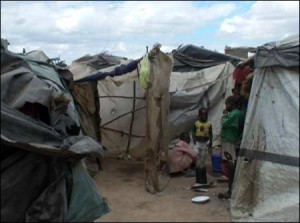Some Perceptions on the Poverty Question in Zimbabwe

In Hopley Farm, Harare, 8,500 adults live in makeshift housing: out of 2,000 school age children, 75% are out of formal school. (July 2010)
By Busani Mpofu
The World Bank estimated urban poverty in Zimbabwe in 1990/91 to be 12 percent while the 1995 Poverty Assessment Study found urban poverty to be 39 percent. In January 2009, Save the Children estimated that 10 out of 13 million Zimbabweans, over 75 percent of the population, were living in ‘desperate poverty.’ In April 2010, UNICEF noted that 78 percent of Zimbabweans were “absolutely poor” and 55 percent of the population, (about 6.6 million) lived under the food poverty line while New Zimbabwe estimated that more than 65 percent of Zimbabweans lived below the poverty datum line in December 2009. Recently, commentators have argued that it is very clear that poverty is increasing in the country. The sense we get from the above statistics is that some agencies have defined certain percentages of Zimbabweans as poor, below some abstractly conceived poverty lines. The statistics, however, do not tell us how long those poor people have existed in poverty conditions or the historical and social dimensions of people’s understandings of poverty-what it is to ‘be poor.’
This article attempts to tackle some perceptions about poverty in Zimbabwe, partly addressing the issue of the changing understandings of what being ‘poor’ has meant to those perceived as poor. Drawing from the experiences of the urban poor, I also attempt to explore historical and social dimensions of people’s understandings of poverty-what it is to ‘be poor’. This is partly because what people do for themselves, as poverty alleviation strategies, presumably turns crucially on how they understand their own circumstances (rather than on whether the state or some other agency defines them as poor or not). Inevitably, the centrality of unemployment as the main cause of poverty featured high among urban Africans during the colonial period. The conception of unemployment, however, appeared to have changed in the post-colonial era especially after 2000 when some professional jobs like teaching began to be associated with poverty.
Perceptions on identifying poverty, its causes and solutions as perceived by the poor themselves, politicians, planners, practitioners, academics and outsiders vary considerably. Other scholars have contended that the problem of defining and fighting poverty is more of a political and technical problem than a rational activity while Pete Alcock argued that we need not look further than politics and politicians to find the causes of poverty as they run the country and are therefore responsible for the problems within it. Understanding poverty thus also requires an understanding of the social policies which have been developed in response to it and which have thus removed, restructured or even recreated it.
A challenge with studying poverty is that it has many facets and people have their own varied and changing notions of it. Worse still, the poor themselves are not a homogeneous group, they are diverse. According to John Iliffe, it is their diversity that makes it even harder to study them. The above problematic is also related to various contested definitions of poverty used by anthropologists, economists, development workers, geographers, sociologists and urban planners and historians. Economists sometimes use indexes and formulas to back up their theories that may be very confusing to historians, while sociologists and development workers may feel they have the monopoly of writing about poverty because of the proximity of their work to the poor in societies and also because the they have at times used the word poverty as a catchword for some of their programmes.
There is therefore no one correct, scientific, agreed definition of poverty because poverty is inevitably a political concept, and thus inherently a contested one.
Full article available for download below in PDF format.
Rights reserved: Please credit the Solidarity Peace Trust as the original source for all SPT material republished on other websites unless otherwise specified. Please provide a link back to http://www.solidaritypeacetrust.org/1109/some-perceptions-on-the-poverty-question-in-zimbabwe/ for this report
This article can be cited in other publications as follows: Mpofu, B. (2011) ‘Some Perceptions on the Poverty Question in Zimbabwe’, 16 September, Solidarity Peace Trust: http://www.solidaritypeacetrust.org/1109/some-perceptions-on-the-poverty-question-in-zimbabwe/




